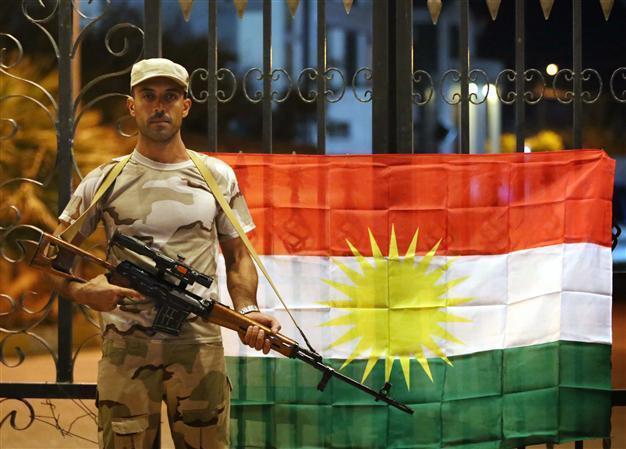Diaspora Kurds return to homeland to battle ISIL jihadists
Emilienne Malfatto ARBIL - Agence France-Presse

A member of the Nawzad Anwerbeg family who left the Netherlands to join the Peshmerga Kurdish forces battling ISIL poses in front of a Kurdish flag on Sept 30 in Arbil. AFP PHoto / Safin Hamed
Three months ago, Karwan Baban said goodbye to Germany and drove his minibus to his native Iraqi Kurdistan to join the peshmerga battling jihadists of the Islamic State in Iraq and the Levant (ISIL).After a five-day road trip through Austria, eastern Europe and Turkey to northern Iraq, he slipped into his peshmerga uniform: "Herr Baban," the Düsseldorf import-export manager, had become "Colonel Karwan."
To the great alarm of their governments, several thousand Europeans have joined the ranks of the ISIL, which proclaimed a "caliphate" over parts of Syria and Iraq in June.
On the other side of the battle line, dozens of Kurds from the European diaspora are also leaving their Western lives behind to take up arms and protect their homeland.
Col. Karwan had already fought for the peshmerga under the dictatorship of former Iraqi President Saddam Hussein.
When ISIL fighters launched their offensive in Iraq in early June and it became clear that they were a threat to Kurdistan, he did not hesitate to leave Germany - where he had lived for a decade - with his family.
The 1,500 peshmerga fighters he now commands include 20 who recently arrived in the autonomous Iraqi region from Europe. In Düsseldorf alone "there are many Kurds and they're all ready to come," he said.
He entertains his guests in a huge house which belongs to the Betwata family of the Khoshnaw tribe, an outlandish structure where blast walls and armed guards shield a little jasmin-scented paradise teeming with children.
Many killed in fighting
Around 20 young men in combat attire and with rifles strapped over their shoulders stood around the tribal leaders. They are all cousins and have just returned from battle.
Many have only recently traded their lives in Amsterdam, Berlin or Rome for the frontlines of northern Iraq.
While some of those who heeded the call by Iraqi Kurdish leader Masoud Barzani to come back and fight for their homeland had prior experience with the peshmerga, others had no experience of war.
That was the case for the Nawzad Anwerbeg brothers, all 12 of them. Some had lived in Iraqi Kurdistan for a few years but most made the trip from the Netherlands.
Aza, who just turned 24, arrived on Aug. 6, four days after the jihadists launched a devastating offensive that brought them within striking distance of the Kurdish capital Arbil.
The Kurds, who are mainly Sunni Muslims, have mostly secular political movements, making them a target for the ISIL militants.
Aza had never used a firearm before so he was given a rifle and two days to practise before going to the front.
"At least something good is coming out of this war - it has shown the world what Kurds are made of," he said proudly.
His main regret is to have arrived too late for the battle to retake Mosul dam, which saw some of the most intense fighting in the four-month-old conflict.
Aza's 32-year-old brother Harem arrived from Amsterdam on June 11 and was at Mosul dam. A piece of shrapnel left a deep scar in his left cheek.
"Our children traveled from Europe to take part in this war. They put on uniforms and were ready to become martyrs," said one of the clan elders, Sarhad Anwerbeg Betwata.
He could not say exactly how many but he said several "European peshmerga" had already been killed in action. "It's an honor for their families, over there in Europe." The Betwata cousins converged from all over the continent: the Netherlands, Germany, Italy and other countries.
"Everywhere except France," one of them quipped, swiftly stressing that Kurds was grateful for the weapons delivered and airstrikes carried out by France.
French police this week reported a teenager of Kurdish origin had mysteriously gone missing after expressing interest in joining the war against the jihadists.
Those who are already in Iraq are all happy to divulge their identity and show their faces, obviously not afraid that their military activity could have legal implications back in Europe.
Karwan is in constant contact with the German authorities and facilitates communication between the peshmerga and Berlin, which has given the Kurds weapons and training.
One of the Nawzad Anwerbeg brothers even called the Dutch Foreign Ministry himself two days after traveling to report his presence in Iraq and in peshmerga ranks.
Buoyed by the exhilaration of fighting among their brothers and cousins in defense of their homeland, many of the diaspora peshmerga have stopped thinking about a possible return. "I'm going to stay here," said Aza, who was training to become an educator in the Netherlands. "And be a peshmerga forever."
















